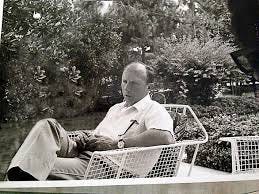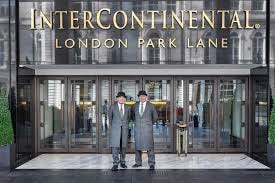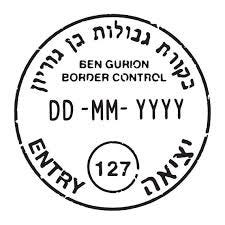EXTRACT 9 FROM MY MEMOIR
The Spy Who Fell to Earth: My Relationship with the Secret Agent Who Rocked The Middle East
20 OCTOBER 2003
It is early morning, and I am still in my pyjamas at my desk. The phone rings, but no one is at the other end when I pick it up. It is, of course, Ashraf Marwan who is using one of his telephone etiquette. So I grab my notebook and am ready, pen in hand, to take notes of our conversation.
Since our first telephone chat the year before, I have meticulously recorded our significant conversations, realizing I am participating in a bizarre story. `It’s your friend,’ he says when I pick up again. He then proceeds through his normal routine, asking about family—wife, kids, schools, projects. He then launches into the matter at hand, the bottom line of which is an invitation to meet up face-to-face in London in ten days’ time.
Three days later, he surprises me when he phones to ask, `What are you doing today?’ I say that I work from home, whereupon he suggests that I come into town and meet him at one o’clock at the Dorchester Hotel in Park Lane. I immediately say that I would rather meet elsewhere, for although I have never had proper espionage training, it just makes sense to try and mess up a little bit the plans of someone who might - just might - want to set a trap for you.
Also, for Israelis who know a bit of history, the Dorchester has a terrible reputation: on 3 June 1982, three Palestinians attempted to assassinate the Israeli ambassador, which then triggered the Israeli invasion of Lebanon, in which I myself participated as a young artillery officer. I can sense that Marwan is quite taken aback by my wish to change the venue, but he agrees to my suggestion that we have our rendezvous at the Intercontinental Hotel - it’s not far from the Dorchester, and I know that place quite well, as that is where I often meet Eli Zeira, the former Director of Military Intelligence, for lunch.
It’s quite late in the morning already, so I quickly put on my best suit, as I know that, being an Egyptian, Marwan will be well dressed, and I scribble a note to my wife - she knows nothing about my espionage games - to say: `Meeting with the Egyptian Ashraf Marwan at the Intercontinental Hotel, at 1p.m’. I put the note on my desk so it is visible and so that someone would know my whereabouts if Marwan did plan to harm me. I know I am playing with fire. I am about to meet up with a person whose nickname in Eygpt in the 1970s was `Dr. Death’; who worked, or is still working, for Mossad and the CIA, MI6, the Italian security services, and perhaps other agencies too. He has all the reasons in the world to seek revenge after I have publicly unmasked him as a spy and probably ruined his life. I have always been responsible, but there has also always been a reckless streak in me, just like in Marwan. I am not scared, far from it, but I am very alert and take some basic precautions.
At Wimbledon, I board the train to Waterloo and from there jump on the London underground in the direction of Park Lane, getting off one stop before where I would be expected to leave the train to go to the Intercontinental. I surface from the Underground and head to the hotel through small side streets, occasionally stopping to check if I am being tailed. Nothing. When I reach the hotel, I can see from a distance that someone is standing by the main entrance, bag on his back, so I cross to the other side of the street and then sneak in through a side entrance; as I said, I know the place quite well. I am a bit late, but Marwan is already there. He is tall and slim, a good-looking man. As expected, he is well-dressed in an expensive suit with a red scarf around his neck. He is pacing backward and forward, looking at his mobile. `Ashraf’. He turns to me and smiles; we shake hands, and he leads me to a deserted part of the lobby.
He orders coffees, and he gets up and fetches them for us when they do not come. He’s very polite, going through his usual inquiries about kids, schools, wife, and work; very accommodating, charming, smiling, nodding, but also as nervous as me. When I fumble distractedly with my tie pin, he looks at my fingers, probably wondering whether I am filming or recording him. From my bag, I fish out some newspapers and spread them on the low coffee table which is in front of us, pointing at pictures of Zvi Zamir, director of the Mossad in 1973; Marwan looks intently at the picture, trying to identify the not-young face of a person whom he had met quite often some thirty years before, not far from where we are sitting now.
Director of Mossad, Zvi Zamir, used to meet his top spy, Ashraf Marwan, quite a lot
I want to talk to him about the book I’m planning to write about him and that I need his assistance with. But, as always, Marwan is full of surprises. He tells me that he is writing a book - a memoir - and that he wishes me to act as his consultant. `I’ll consult you from time to time,’ he says. I am taken aback but immediately say that if that’s the case, then there is no point in me writing his story, too, and that I would be happy to help him. I ask him about Egypt and how the Egyptians have reacted to the revelations about his past. `In Egypt,’ he says curtly, `we don’t talk about this.’ I try a direct question about his activities, asking him about the warning he gave to the Israelis that war would start in the evening when, in fact, it started at two in the afternoon. Did he say so on purpose in order to mislead the Israelis? He smiles, he is a bit evasive, and he then speaks: `A few hours … does it really matter?’ you’re a colorful person,’ I say, which he takes as a compliment and, beaming contentedly, he replies, `Thank you.’
We finish our coffees, I gather my papers, and we stay a little longer before departing. We walk to the front door, and it is then, Marwan on my right, that he says that he is concerned that he might be assassinated. I turn to him and hasten to say that it is not in the interest of the Mossad to kill him, as this would cause more damage than good; it might deter potential spies from joining them. `But I don’t know about Egypt,’ I add frankly. He does not reply but warns me not to contact his Cairo office anymore as `the Egyptians are monitoring it.’ And not to phone his home number, `as the British are monitoring it.’ He gave me his mobile number, asking me to text him directly if necessary. A black car is waiting outside for him, the driver standing by its door. We shake hands again, and we go our different ways. I return home, remove the note I left for my wife, and summarize the meeting. What a day!
The Intercontinental Hotel in Park Lane, where I had my first meeting with Ashraf Marwan
Marwan had warned me not to contact him in Cairo, but I might have had to do so regardless the following year, as I was to travel to Israel with a BBC crew to work on a TV documentary and was concerned that when I landed in Israel the authorities there might arrest me for revealing the name of a top Mossad spy. But who could rescue me if I was detained there? Ironically, I concluded, it could be Ashraf Marwan. He kept telling me that he wanted the entire story about him `to die,’ but clearly if I were to be detained upon landing, especially traveling with a group of BBC journalists, such an arrest would make headlines. So, in case I was arrested, I prepared a letter which I deposited with my wife and which was to be faxed to Marwan’s private fax in Cairo in that eventuality:
17 May 2004
Dear Ashraf,
When you get this letter (which was prepared in advance and faxed to you by my wife), I am detained in Israel. I came here with the BBC to work on a TV documentary and was stopped by the Israelis, who probably want to ask me some questions about the Ashraf Marwan Affair and who was my source [who revealed Marwan’s name to me]. They will get nothing from me …. but the damage to you will be substantial. When we met at the Intercontinental Hotel, I recall you telling me that you really wanted me not to deal with this matter anymore and to keep quiet (which I did). But arresting me will turn this into a major story … Here is my advice: phone your [Mossad] friends in Israel and instruct them to release me at once.
Yours
Ahron
PS: A strange and ironic situation, isn’t it? We become dependent on each other.
There was no need to use this letter, as in Israel, I passed through passport control without a hitch; it really surprised me that the authorities there were so patient with me.
It always surprised me that the Israelis never stopped me, especially when I crossed into Israel
In subsequent weeks, we spoke quite a lot on the phone. Most of the talks were short - brief exchanges - and often, even more than before, I had this nagging feeling that Marwan’s reason for phoning was to keep an eye on me and ensure I behaved myself. He would phone and ask his routine polite questions, and since I was now also the adviser on his memoir, he always posed the occasional question about the 1973 war, which `is information I need for the book I am working on.’ His instincts were sharp, and I was sure he sensed I suspected that appointing me as his consultant might have been his way to stop me from writing the book myself. I was indeed suspicious, so, occasionally, I would tackle him, asking questions that would help me judge by his response or tone whether he was actually working on his memoir. `So what’s the name of your book?’ I asked on one occasion. `1973 - What Happened?’ he shot back. `Is it written in Arabic?’ `No, it’s in English because Arabs don’t read books.’ Still, I was not sure, and I kept on trying him.
From my diary (a summary of a telephone conversation with Marwan):
7 May 2005
Ashraf Marwan phoned … polite as ever … heavy Arabic accent. `It’s your friend,’ he says. We talked from 09.45 to 10.05 on the morning of Saturday … He gave me his home address and asked me not to send anything to his office (home address: 24 Carlton House Terrace, London, SW1Y 5AB. Mobile: 07712777717). Asked me about what I do. I explained about the Penguin book [which I was writing on the Occupied Territories]. He congratulated me. I’ve asked him about his book. He said, `Half of it is already written and will deal with 1973 until disengagement [in 1974].’ `When will you publish it?’ I ask, `Perhaps in five years,’ he says, adding, `I’ll need your help.’
I learned to identify Marwan’s swinging moods by the tone of his voice; at this point, he was clearly upset. Perhaps it was his worsening health condition, which he frequently alluded to, or his growing (unproven) suspicion that Mossad, his former employer, was orchestrating a smear campaign against him.
What he genuinely found difficult to comprehend was how I, and other journalists too, could say things in books and newspaper articles that the Israeli censor failed to stop being published. I once updated him about an article published in Yediot Aharonot, a leading Israeli newspaper, where Marwan is seen standing alongside Egypt’s President Hosni Mubarak, under the headline: `THIS IS HOW MUBARAK HUGS OUR SPY.’ A few days later he phoned me from a cab. I immediately recognized that he was furious and hurt. Without going through his usual preliminaries, he flew into a rage, launching into a tirade of angry shouts. His voice choked as I had never heard before, and he screamed at me at the top of his voice: `Why are they [Mossad] doing this to me? Why are they taking revenge?’ When he’d calmed down, he lowered his voice and said that the photographs were old images, taken two years before and, as he regarded it, the fact that the Israelis used these images so long after they were actually taken demonstrated that the Mossad was trying to drive a wedge between him and Mubarak. When I put down the phone, I was as upset as Marwan as I imagined how it must feel to be in his position.
6 OCTOBER 2006
It is the thirty-third anniversary of the Yom Kippur War, and I am thinking of Marwan. Then the phone rings.
From my diary (a summary of a telephone conversation with Marwan):
Ashraf phoned at around 13:05 (long conversation; forty minutes or so). He used the old trick as he did before. First called and kept silent, listening to my voice to ensure that it was me on the other end. Then I disconnected, and a few minutes later, he phoned again (not identifying himself, of course). We talked about the weather first. He’s apparently in America (so he says). Health problems `for the last three years’, but `I am in good hands’. He asked for the name of Arieh Shalev’s new book on the Yom Kippur War, and I patiently dictated Shalev’s name (he asked me to wait while he turned off the television). He said, `They [The Israelis] can say whatever they want … The results of the war speak for themselves. [Prime Minister] Golda Meir wanted to commit suicide … The Israelis lost hundreds of tanks on the first day of the war.’ Rambling, rambling, rambling, and I could hardly understand how one thing was linked to the other. `I am not Superman,’ he said, probably meaning that he was working with others to deceive Israel in 1973. He said, `Sadat’s only mistake was to move forward into the desert on 14 October because [Syria’s President] Assad was screaming …’ He told me about the medal he received and about Sadat’s speech in which he had said that `without this man (a reference to Ashraf) we would never have won the war.’ He’ll show me the English version of Sadat’s speech when we meet again `in a few months when I am back from America.’ Said that he wrote all of Sadat’s speeches and they were a team of forty people whose task it was `to feed the Conception to the Israelis [that Egypt will not embark on war before obtaining certain weapons] … there was no single, double agent … there was Egypt’, as he put it. Quite talkative: `Keep updating me,’ he said. The bottom line is that he’s not going to admit that he was a spy at all; he was just part of a bigger machine that misled the Israelis.
He talks so much that I suspect he’s perhaps on medication or something, so at the end of my note, I scribble: `Marwan’s in a talkative mood.’
COMING SOON: CHAPTER 6 MARWAN IS DEAD


![Ahro[n]pinion: Israel & Middle Eastern Affairs](https://substackcdn.com/image/fetch/w_36,h_36,c_fill,f_auto,q_auto:good,fl_progressive:steep,g_auto/https%3A%2F%2Fsubstack-post-media.s3.amazonaws.com%2Fpublic%2Fimages%2Fa3267808-8a75-4b8a-acfb-53838512afbe_1059x1059.png)



